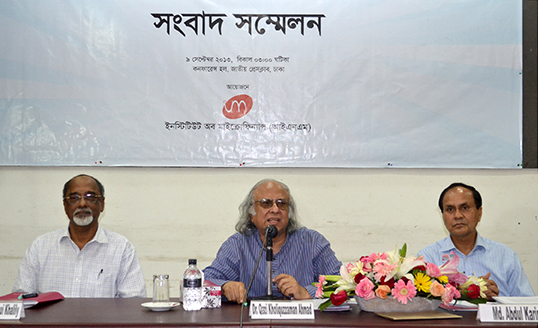
"For sustainable poverty reduction and improved livelihoods, an integrated approach is essential…." said Dr. Qazi Kholiquzzaman Ahmad, Chairman InM
“Access to finance is undoubtedly necessary for the poor people to come out of poverty, but certainly microcredit alone is not of much avail in this context. For sustainable poverty reduction and improved livelihoods, an integrated approach including financing, education, training, health services, sanitation, infrastructure, social capital, access to technologies, proper arrangement for marketing of produced goods and services etc. is essential.”, said Dr. Qazi Kholiquzzaman Ahmad, Chairman, Institute of Microfinance (InM) at the Press Conference held on September 9, 2013 at the National Press Club. Professor M. A. Baqui Khalily, Executive Director, InM, and Mr. Md. Abdul Karim, Managing Director, Palli Karma-Shahayak Foundation (PKSF) were also present at the occasion.
InM organized the press conference to present the InM esearch findings and way forward of the two-day National Conference held on August 24-25 on 'Microfinance and Development'. The National Conference were attended by local and international academicians, government officials, policymakers, development practitioners and sector stakeholders.
While addressing the journalists and audience at the press conference, Dr. Ahmad said that lack of education and lack of access to proper health services are two key problems faced by the poor people. Therefore, through an integrated approach, with emphasis on these two elements and encompassing other elements including adequate financing, sustainable poverty reduction should be possible.
Dr. Ahmad said, PKSF has been implementing its integrated program ENRICH through its POs in 43 unions around the country. From the experience of the 21 unions included in the first phase of the program about two years ago, it is clear that the poor people are participating in various activities of the program such as education, skill training, health, sanitation and income earning activities with enthusiasm. It is also seen that the results are encouraging.
On “impact of microcredit on poverty reduction” issue, Dr. Ahmad said, InM has been collecting data concerning this issue repeatedly over the years to generate realistic conclusions and the study showed that, of the poor microcredit receivers over the years up to 2010, about 10% have escaped poverty. In other words, 90% have remained below the poverty line. However, the economic condition of many of them has improved relative to the position before they started taking microcredit; but, at the same time, for many others, a backsliding has occurred, often as they have gotten into borrowing from different sources resulting in their increased indebtedness or because they have used the borrowed money for other purposes (such as marriage of sons or daughters, and medical treatment of family members) thereby falling into a conundrum relating to earning an income and repaying the loan.
The study on “Overlapping” showed that that over 60% of the total microcredit received from multiple sources is used to expand the borrowers’ financial base, while about 40% is used for social activities and for repayment of loans taken previously. This information relates to 2009. It appears that, in majority of the cases, microcredit available from one source is not adequate for the economic purposes at hand or planned, while in other cases indebtedness of the concerned micro-borrowers increases as the borrowed money is not used for income-earning purposes.
Another research of InM showed that the impacts of climate change are not only economic in nature, but they also give rise to health hazards. The paper presented at the seminar showed that a rural family has to spend, on average, Tk.4,200 for securing health services for the family. Moreover, about 50% of the poor families are in fact constrained to use of all of their savings and 25% in fact find themselves borrowing at high rates of interest in addition to using up all of their savings in order to provide essential health services for the members of their families. It is, therefore, essential that appropriate health services be ensured for all poor families. Dr. Ahmad mentioned that an elaborate health service program is included in both PRIME and ENRICH of PKSF.
Dr. Ahmad added further that InM will conduct research as to how and through what kinds of institutions, health and other types of insurance can be effectively provided to the poor; and will make recommendations in that regard.
InM will also conduct research activities in relation to the ENRICH and similar other programs of the PKSF and other organizations in order to suggest ways of implementing such programs more effectively and on a sustainable basis.
In his concluding remarks Dr. Ahmad said, it is necessary to identify and promote businesses and enterprises, in respect of which there is potential for increasing productivity. Also, agricultural processing has to be prioritized for promotion and expansion. With a view to increasing productivity, access to appropriate technologies and necessary skill, management, and entrepreneurship training, and also improved infrastructure should be ensured.
